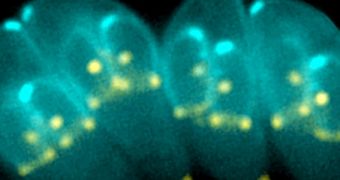Investigators from the Michigan State University, led by associate professor of experimental psychiatry Lena Brundin, argue in a new study that the common parasite Toxoplasma gondii may be able to elicit small changes in brain chemistry, which may in turn lead to suicidal attempts.
In a paper published in the August issue of the esteemed Journal of Clinical Psychiatry, the research group reveals that the presence of the parasite in the body can lead to inflammation, which in turn produces a series of chemicals (known as metabolites) that can adversely affect neurons.
These conclusions are very important because 10 to 20 percent of people in the United States are believed to be infected with T. gondii. Until now, scientists thought that the microorganism remained dormant most of the time, Science Blog reports.
“Previous research has found signs of inflammation in the brains of suicide victims and people battling depression, and there also are previous reports linking [T.] gondii to suicide attempts. In our study we found that if you are positive for the parasite, you are seven times more likely to attempt suicide,” says Brundin.

 14 DAY TRIAL //
14 DAY TRIAL //